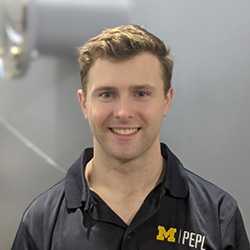
PhD Student Recognized at 71st Annual JANNAF Propulsion Meeting
PEPL student Will Hurley received Best Student Paper Award for his work on Hall thruster performance and design

PEPL student Will Hurley received Best Student Paper Award for his work on Hall thruster performance and design

Aerospace Engineering PhD student William Hurley was honored at the 71st annual Joint Army Navy NASA Air-Force (JANNAF) Propulsion Meeting where he received the Best Student Paper Award for his work titled “Performance of a Magnetically Shielded Hall Thruster on Air and Nitrogen.”
As the most widely used electric propulsion device in space, Hall thrusters traditionally operate most efficiently on Noble gases like xenon and krypton. However, in recent years, researchers have begun looking at more readily available and cheaper gases, such as oxygen and nitrogen.
In his most recent work, Hurley and a team within the Plasmadynamic and Electric Propulsion Laboratory (PEPL) directly measured the various efficiency loss processes of a Hall thruster operating on air and nitrogen. With this research, they identified the primary drivers of poor performance and have successfully outlined a path towards achieving a high-efficiency thruster using these gases.
Hurley, a student working in Professor Benjamin Jorns’ Plasmadynamics and Electric Propulsion Laboratory, has largely focused his academic career on the performance and design of Hall thrusters. “This achievement would not have been possible without the support of both my advisor Benjamin Jorns and lab mates. I am very excited to continue pursuing this work to better understand and optimize Hall thruster performance going forward,” stated Hurley upon receiving the award.
The 71st JANNAF Propulsion Meeting gathered both governmental and non-governmental entities, with a focus on research and applications at the systems level, spanning over six mission areas. These areas include: Tactical Propulsion, Missile Defense/Strategic Propulsion, Propulsion Systems for Space Access, Gun and Gun-Launched Propulsion, Propulsion and Energetics Test Facilities, and Sensors for Propulsion Measurement Applications. This event provided an opportunity for researchers and experts to share technical information about research in propulsion.